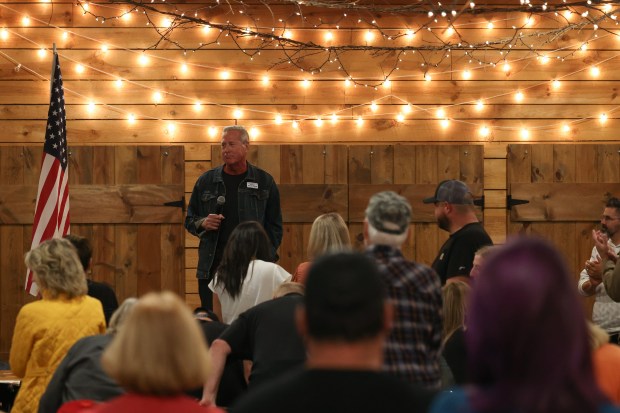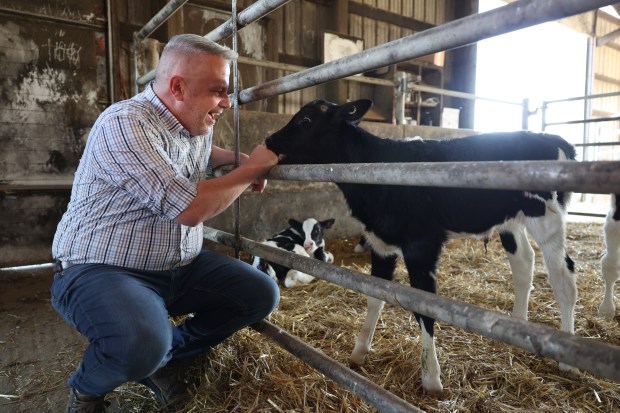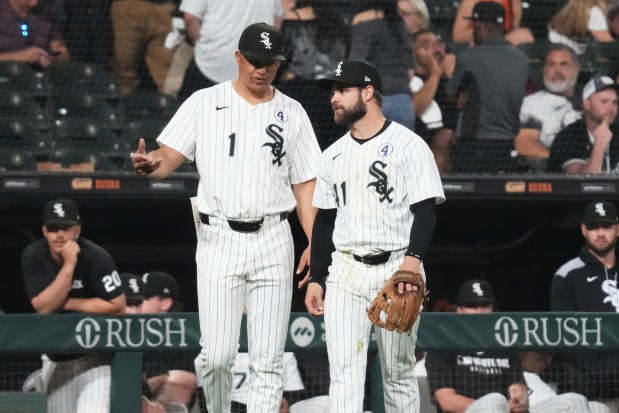MOLINE, Ill. — Illinois Democrats are looking to maintain their 14-3 dominance over Republicans in the state’s congressional delegation, with the closest race Tuesday expected to be first-term Democratic U.S. Rep. Eric Sorensen’s reelection bid against Republican Joe McGraw in the downstate 17th Congressional District.
Sorensen, a former TV weatherman from Moline, and McGraw, a recently retired Winnebago County judge from Rockford, are vying to represent a sprawling district that spans 14 counties and melds Democratic-leaning areas such as Rockford, the Illinois half of the Quad Cities, Peoria and Bloomington-Normal by running through vast expanses of farmland and ruby-red rural communities.
Democrats have held the seat for all but two years over the past four decades, but the GOP saw an opportunity because Sorensen two years ago underperformed Joe Biden’s 2020 margin of victory over Donald Trump in the area that now makes up the district.
The race has been widely viewed as the only one in Illinois that could have an impact on which party controls Congress when the new term begins in January.
In the 12 races to represent Chicago and its suburbs in Washington, Democratic incumbents have collectively outraised their Republican challengers by a 16-to-1 margin, according to federal campaign finance reports. One of those challengers, Glen Ellyn Republican Niki Conforti, who is taking on three-term Democratic Rep. Sean Casten, of Downers Grove, in the 6th District, went so far as to ask the press to “respect our privacy” and not plan to attend her election night gathering at a Countryside sports bar.
Downstate, first-term Democratic Rep. Nikki Budzinski, of Springfield, is widely favored to win over Republican challenger Joshua Loyd, of Virden, to represent the 13th District, which cuts across central Illinois from Champaign-Urbana, through Decatur and Springfield to the Metro East suburbs of St. Louis.
In far southern Illinois, GOP Rep. Mike Bost, of Murphysboro, faced a nominal challenge from Democratic Rep. from Democrat Brian Roberts, of DeSoto, in the 12th District. Bost’s two fellow Republicans in the delegation, Reps. Mary Miller, of Hindsboro, and Darin LaHood, of Peoria, ran unopposed.
In the 17th District, both Sorensen and McGraw have tried, and at times struggled, to distance themselves from their respective political parties. The race in the heavily blue-collar district has centered on many of the controversial issues that have driven the presidential race at the top of the ballot, including immigration, crime, the economy and abortion rights.
Sorensen, whom national prognosticators expect to win the race, began Election Day by accompanying a 98-year-old World War II veteran to the polls in Moline before gathering with supporters at a downtown bar.
McGraw, who hoped for a bump from a late endorsement by the U.S. Chamber of Commerce last week, was scheduled to visit three Rockford polling places throughout the day before watching the returns with supporters at an Italian restaurant in the northern Illinois city.
National money has poured into the race, with Sorensen having raised more than $4.7 million during the election cycle and still having nearly $1.4 million in his campaign bank account as of Oct. 16, according to the most recent filings with the Federal Election Commission. McGraw brought in nearly $1.4 million during that time and had more than $331,000 on hand as of Oct. 16.
Sorensen has received $1.5 million through ActBlue, the Democrats’ online fundraising platform for small donors. His largest contributors are two pro-Israel groups, which has drawn criticism from pro-Palestinian supporters on social media. The American Israel Public Affairs Committee has given Sorensen nearly $83,000, and JStreetPAC has given him more than $39,000, records show.
Sorensen also has reported receiving $10,000 from the Democrats’ House Majority political action committee, along with $4,000 from the campaign fund of House Minority Leader Hakeem Jeffries, of New York.
Although he hasn’t raised as much, McGraw has received sizable contributions from PACs controlled by House Speaker Mike Johnson and Majority Leader Steve Scalise, reflecting the competitive nature of the race. Johnson’s Grow the Majority has given more than $159,000, while Scalise’s Eye of the Tiger PAC has contributed $10,000, records show. He’s also received more than $152,000 through WinRed, the GOP’s small-dollar platform.
In addition to the national issues at play in the race, the role religion plays in society also has entered the debate, with Sorensen in a TV commercial criticizing past comments from McGraw about how prayer guided his judicial decisions, underscoring the former judge’s affinities with the religious right.

Responding to the ad, McGraw told an audience at a private event last month that he would “not apologize for praying” and that “there is no separation of church and state.”
Republicans, meanwhile, have criticized Sorensen, the state’s first openly gay member of Congress, as being too liberal for the district. They’ve latched on to past social media posts from Sorensen discussing youth drag events and criticized his support for gender-affirming health care treatments. In campaign ads, the McGraw campaign has attacked Sorensen, saying the congressman “supports exposing minors to life-altering sex changes.”
Sorensen has said voters in the district are more concerned about their own livelihoods and well-being than those issues.
In Chicago and the suburbs, all 12 Democratic incumbents faced challenges this year, but all were expected to hold on to their seats.
In the 1st District, representing the South Side and southwest suburbs, first-term Rep. Jonathan Jackson, the son of the Rev. Jesse Jackson, faced Republican Marcus Lewis, a Trump supporter who in an interview with the Tribune called the Democratic presidential nominee, Vice President Kamala Harris, “a dummy” who was “selected by the devil” to run for president.
Rep. Robin Kelly, of Matteson, sought reelection to the seat she’s held since 2013, when Jackson’s brother, Jesse Jackson Jr., resigned from Congress amid a federal corruption probe. Kelly’s challenger for the seat representing the 2nd District, which stretches from the south suburbs to Danville, was Ashley Ramos, a Latina Republican from rural Clifton.
Seeking a second term representing the 3rd District, which runs from Chicago’s Logan Square neighborhood through DuPage County to west suburban Wheaton, progressive Rep. Delia Ramirez, of Chicago, faced Republican John Booras, of Homer Glen.
Coming off a disappointing fourth-place finish in last year’s Chicago mayoral election, Rep. Jesús “Chuy” García faced a challenge in the 4th District from Republican Lupe Castillo, a relative newcomer who lives just down the street from García in the Little Village neighborhood. Also on the ballot in the district, which goes from Little Village to Melrose Park, was Ed Hershey of Chicago, running under the banner of the left-wing Working Class Party.
In the North Side and northwest suburban 5th District, Rep. Mike Quigley, of Chicago, faced a fourth challenge from self-described MAGA Republican Tommy Hanson, a Chicagoan who aligns himself with Trump’s “Make America Great Again” slogan.
In the 6th District, Casten sought a fourth term representing territory that ranges from west suburban Lombard to south suburban Tinley Park, facing a challenge from Conforti, a Glen Ellyn businesswoman.
The oldest member of Illinois’ congressional delegation, 83-year-old Rep. Danny Davis, of Chicago, survived a bruising five-way Democratic primary in March to take on perennial GOP candidate Chad Koppie, 86, in the 7th District, whose boundaries go from downtown Chicago to Hillside.
In the largely suburban 8th District, Rep. Raja Krishnamoorthi, of Schaumburg, one of the most prodigious fundraisers in Congress, faced a challenge for a fifth term from Republican Mark Rice, a first-time candidate and an energy entrepreneur from Chicago.
Rep. Jan Schakowsky, of Evanston, sought another two years in a seat she’s held since 1999, facing Republican challenger Seth Cohen, of Skokie. The 9th District runs from Chicago’s Uptown neighborhood through the North Shore to Lake and McHenry counties.
In the neighboring 10th District, which stretches from the North Shore to the Wisconsin border, Rep. Brad Schneider, of Highland Park, sought a fifth consecutive term and a sixth overall in a race against Republican Jim Carris, of Lake Forest.
The self-proclaimed “only physicist in Congress,” Rep. Bill Foster, of Naperville, faced a challenge from Republican Jerry Evans, of Warrenville, in the 11th District, which spans from Naperville to Belvidere. Foster served in Congress from 2008 to 2011 and returned in 2013.
Rep. Lauren Underwood, a fellow Naperville resident who became the youngest Black woman ever elected to Congress in 2018, sought a fourth term in the 14th District, which runs from the Joliet area through parts of Naperville and Aurora to DeKalb and LaSalle counties. She faced a challenge from perennial candidate and former Kendall County GOP Chairman James Marter, of Oswego.
Petrella and Freishtat reported from Chicago.




